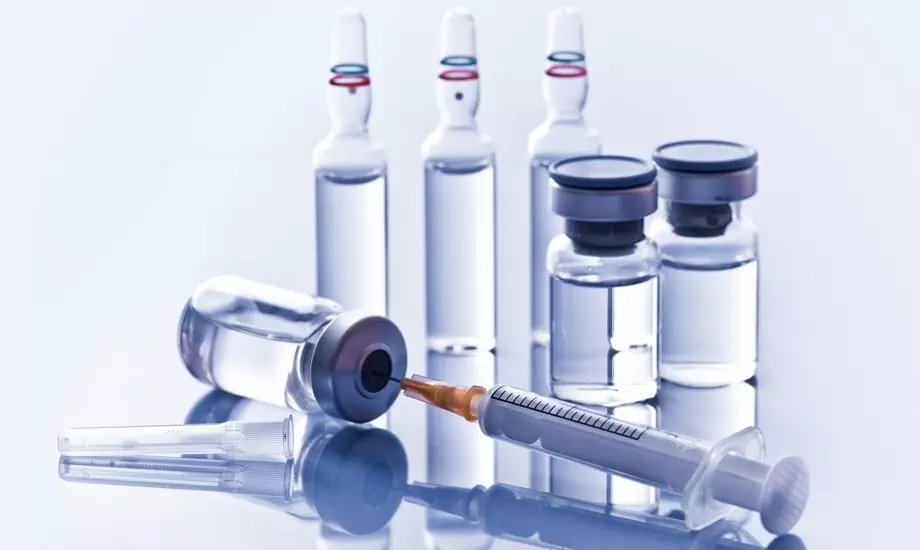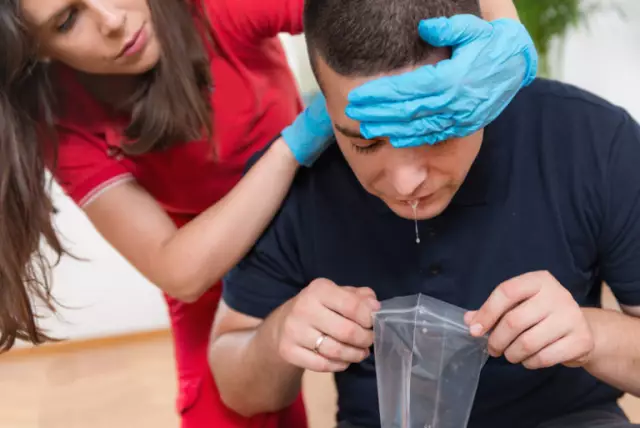- Author Rachel Wainwright wainwright@abchealthonline.com.
- Public 2023-12-15 07:39.
- Last modified 2025-11-02 20:14.
Morphine poisoning
Morphine is the main of the 20 alkaloids in opium: it accounts for 10% of the total opiate mass. It is found in various types of poppy, mainly in the sleeping pill (Papaver somniferum), or opium.

Source: depositphotos.com
Morphine is widely used in medicine in the form of hydrochloride (solution for subcutaneous, intramuscular, intravenous injections, administration near the dura mater) and sulfate (for oral administration). It is rapidly absorbed into the systemic circulation and has a lasting effect after 10-20 minutes, depending on the route of administration.
The wide application is due to its unique characteristics:
- inhibits the transmission of pain impulses;
- reduces the excitability of pain centers;
- has an anti-shock effect;
- neutralizes the emotional assessment of pain;
- causes euphoria, a feeling of complacency and elevated mood, regardless of real conditions;
- in large doses has a pronounced sedative effect.
In addition to pain relief, it provokes a number of effects on the part of the smooth muscles of the internal organs (selectively weakening or increasing the tone), changes the reactivity of some regulatory centers, slows down the basal metabolism, and lowers body temperature.
The conditions in which morphine is prescribed are characterized by persistent intense pain syndrome that cannot be stopped by non-narcotic analgesics:
- oncological diseases in the terminal stage;
- acute myocardial infarction or progressive angina pectoris;
- complicated postoperative period;
- extensive injuries;
- acute heart failure, etc.
The ability of morphine to induce a persistent state of euphoria is the reason for its use for drug intoxication. At the same time, physical and mental dependence (morphinism) develops rapidly.
In Russia, morphine and its derivatives (morphine hydrochloride, morphine sulfate) are included in the list of narcotic and psychotropic drugs with controlled limited circulation. Some derivatives (benzylmorphine, hydromorphinol, desomorphine, dihydromorphine, etc.) are included in the list of prohibited drugs.
The lethal dose of morphine for an adult is 0.1-0.5 g. With morphinism (drug addiction), the lethal dose increases to 3-4 g due to the development of a decrease in sensitivity in people who regularly take the drug.
How does morphine poisoning occur?
Morphine poisoning, if used for therapeutic purposes, occurs in the following situations:
- incorrect dosing;
- increased individual sensitivity;
- increasing the frequency of reception;
- the wrong choice of the method of administration of the drug of a certain concentration;
- in young children - due to the imperfection of the hepatic enzyme systems and the possibility of the development of paradoxical reactions.
In addition, acute intoxication develops in persons:
- with drug addiction with an overdose of morphine;
- who received the drug by mistake;
- have taken the drug for suicidal purposes.
Poisoning symptoms
The main symptoms of acute intoxication are neurological disorders, respiratory depression, cardiovascular complications.
In acute morphine poisoning, the following are noted:
- excitation followed by excessive inhibition;
- cold clammy sweat;
- pallor of the skin;
- itching and puffiness of the face;
- increased salivation;
- tiredness, drowsiness;
- decrease in body temperature;
- dryness of the oral mucosa;
- urinary retention, constipation;
- vomiting;
- hallucinations;
- increased muscle tone, up to rigidity;
- dizziness, noise, ringing in the ears;
- a sharp, punctate constriction of the pupils, lack of reaction to light (dilated pupils in case of morphine poisoning indicate an incipient agonal state);
- clonic-tonic convulsions.
Morphine specifically affects the cortical centers of the brain, which causes a characteristic change in the phases of the victim's activity: excessive excitement and euphoria are replaced by lethargy, drowsiness, followed by the development of a soporous state and coma.

Source: depositphotos.com
The development of delirious psychosis is possible - a loss of orientation in time and space, combined with hallucinations that increase excitement and provoke delusional experiences.
The most dangerous manifestation of morphine poisoning is a decrease in the sensitivity of the respiratory center to the concentration of carbon dioxide in the blood, and, as a consequence, its depression. As a result, pathological Cheyne-Stokes respiration develops, which is characterized by a violation of the depth of inspiration and expiration with periodic episodes of respiratory arrest (apoe).
The consequence of unproductive breathing is the rapidly developing acute oxygen starvation of organs and tissues, acidification of the internal environments of the body (acidosis). These changes lead to a sharp drop in blood pressure, which, along with the development of increased vascular permeability, can lead to pulmonary edema.
With the progression of respiratory disorders, acute vascular insufficiency (collapse, shock) develops.
Death in severe cases usually occurs within a few hours from paralysis of the respiratory center.
First aid for morphine poisoning
First aid for acute morphine intoxication is aimed at its early evacuation from the gastrointestinal tract:
- Carry out a gastric lavage, for which you drink 1-1.5 liters of warm water or a slightly pink solution of potassium permanganate, then press on the root of the tongue and provoke an emetic urge.
- Take enterosorbent (Enterosgel, Polysorb, Atoxil, Lactofiltrum).
- Take a saline laxative (magnesium sulfate).
- If the victim has signs of clinical death (lack of consciousness, breathing, pulsation in the carotid arteries and pupil response to light), proceed with elementary cardiopulmonary resuscitation, carry out it before the arrival of an ambulance.
In addition, it is necessary to maintain the victim in consciousness: it is easy to pat on the cheeks, shout, pinch the earlobes, talk and force them to answer questions.
Taking any medications without consulting a doctor at the stage of first aid is categorically contraindicated. This is due to the ability of morphine to alter the strength and duration of exposure and increase the toxicity of a number of drugs.
When is medical attention required?
In all cases of morphine poisoning, qualified medical care is required.
To neutralize the side effects of morphine, it is necessary to introduce a specific antidote - Naloxone or Nalorphine, stimulants of cardiac and respiratory activity and, in some cases, conduct urgent resuscitation measures in order to maintain the functions of vital organs.
Possible consequences
Complications resulting from morphine poisoning include:
- paralysis of the respiratory center;
- accession of a secondary infection (bronchopneumonia, pneumonia);
- pulmonary edema;
- swelling of the brain;
- coma;
- fatal outcome.
Prevention
- When taking morphine for medical reasons, do not adjust the frequency of administration and / or dose yourself.
- During treatment with morphine, do not take drugs that affect the central nervous system without a doctor's prescription.
- In case of side effects on the standard dose after the first application, immediately inform the treating doctor about it.
- If there is a patient in the house who is taking morphine, keep the drug out of the reach of children, separately from other drugs.

Olesya Smolnyakova Therapy, clinical pharmacology and pharmacotherapy About the author
Education: higher, 2004 (GOU VPO "Kursk State Medical University"), specialty "General Medicine", qualification "Doctor". 2008-2012 - Postgraduate student of the Department of Clinical Pharmacology, KSMU, Candidate of Medical Sciences (2013, specialty "Pharmacology, Clinical Pharmacology"). 2014-2015 - professional retraining, specialty "Management in education", FSBEI HPE "KSU".
The information is generalized and provided for informational purposes only. At the first sign of illness, see your doctor. Self-medication is hazardous to health!






